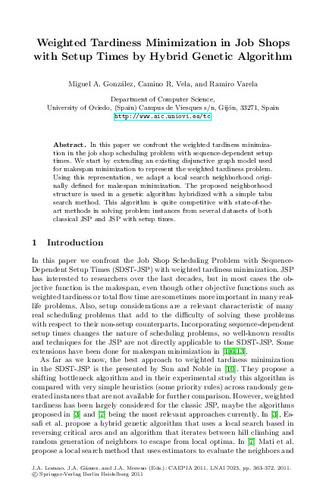Weighted tardiness minimization in job shops with setup times by hybrid genetic algorithm
Autor(es) y otros:
Fecha de publicación:
Editorial:
Springer
Versión del editor:
Citación:
Serie:
Lecture Notes in Computer Science;7023
Descripción física:
Resumen:
In this paper we confront the weighted tardiness minimization in the job shop scheduling problem with sequence-dependent setup times. We start by extending an existing disjunctive graph model used for makespan minimization to represent the weighted tardiness problem. Using this representation, we adapt a local search neighborhood originally defined for makespan minimization. The proposed neighborhood structure is used in a genetic algorithm hybridized with a simple tabu search method. This algorithm is quite competitive with state-of-the-art methods in solving problem instances from several datasets of both classical JSP and JSP with setup times
In this paper we confront the weighted tardiness minimization in the job shop scheduling problem with sequence-dependent setup times. We start by extending an existing disjunctive graph model used for makespan minimization to represent the weighted tardiness problem. Using this representation, we adapt a local search neighborhood originally defined for makespan minimization. The proposed neighborhood structure is used in a genetic algorithm hybridized with a simple tabu search method. This algorithm is quite competitive with state-of-the-art methods in solving problem instances from several datasets of both classical JSP and JSP with setup times
Descripción:
Conference of the Spanish Association for Artificial Intelligence, CAEPIA 2011 (14th. 2011. La Laguna, España)
ISBN:
ISSN:
Identificador local:
20111628
Patrocinado por:
This research has been supported by the Spanish Ministry of Science and Innovation under research project MICINN-FEDER TIN2010- 20976-C02-02 and by the Principality of Asturias under grant FICYT-BP07-109
Colecciones
- Capítulos de libros [6535]
- Informática [875]
Ficheros en el ítem




